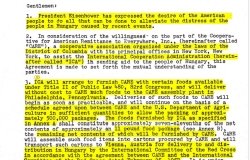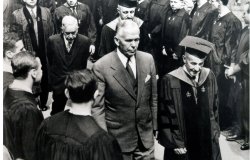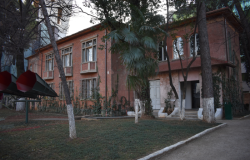Perspectives on European Union (EU) Relations with Cuba
The EU is now engaged in a process of normalizing relations with Havana. Much like the United States, it finds itself trying to strike a balance between sectors.
Overview
Roy said that in 2003, following a Cuban government crackdown that resulted in the jailing of seventy-five dissidents (fifty-five remain imprisoned), the European Union imposed diplomatic sanctions. These were wholly diplomatic and included a freeze on visits by high-level officials, but did not impact trade or investment in Cuba. The sanctions were temporarily suspended in 2005 and formally lifted in June 2008. The EU is now engaged in a process of normalizing relations with Havana. Much like the United States, it finds itself trying to strike a balance between diplomatic and commercial engagement, the need for improvements in Cuba's human rights record, and development cooperation.
Roy stressed that the relationship between the EU and Cuba has, until now, been exceptional; Cuba is the only Latin American country without an agreement with the EU and towards which the EU has a common position. Recent developments—including the formal lifting of diplomatic sanctions and the February 2009 visit to Havana by European Commissioner for Development and Humanitarian Aid Louis Michel—demonstrate the EU's current, albeit not original, commitment to working towards a better and stronger relationship with Cuba. Some of the EU's earliest attempts, such as those in 1995 and in subsequent years, were thwarted by increasing tension between Cuba and the United States, such as that reflected in the passage of the Helms-Burton Act in 1996. That legislation extended the territorial application of the U.S. embargo to foreign investors in Cuba, penalizing them for dealing with expropriated properties and effectively forcing the United States and the EU to reach an "understanding" to avoid a trade war. The current decade, however, has seen some changes in the EU-Cuban relationship. For example, Roy said, in 2000 Cuba was admitted as an observer to the Africa Caribbean Pacific – European Union Assembly (ACP), the essence of which Roy compared to joining a golf club without playing golf. Then, in 2003, the EU opened its first delegation in Havana. The EU, however, made clear its intention to maintain its common position on Cuba; as a result, in 2003 Cuba withdrew its application to the ACP. Following a series of devastating hurricanes in 2008, the EU decided to treat Cuba as it would any other country with respect to humanitarian issues. EU diplomatic representation in Cuba is notable; seventeen EU member states have diplomatic missions in Cuba, and tourism is both large and growing. According to Roy, the relationships with Spain, Italy, France, Germany, and Belgium are the most important ones for Cuba.
Roy also highlighted that Cuba's special relationship with Spain—notwithstanding Spain's defeat in the War of 1898—dates back more than 500 years. Effectively, both the EU and Spain have sought to facilitate the transition to democracy in Cuba. The centerpiece of the policy is constructive engagement and political dialogue with Cuba. Indeed, in 2004, the new Spanish government determined that the existing policy was counterproductive and began to normalize the relationship. Although the Spanish government provides development aid to Cuba, the actual percentage is small compared to what Spain gives throughout the rest of Latin America. Roy also contended that the figures regarding Spanish investment in Cuba are overblown; when compared with the bulk of Spanish investments elsewhere in Latin America, Spanish investment in Cuba is very small.
Summarizing his assessment of current EU policy towards Cuba as well as the U.S.-Cuban relationship, Roy indicated that 1) the conflict between Cuba and the United States must be resolved bilaterally; 2) the EU opposes the U.S. embargo as it violates the EU's core tenet of free trade; and 3) Cuba must reform if it desires a cooperation program similar to the one enjoyed by the rest of the Latin America. Although the EU is aware that Cuba will not change overnight, Roy suggested that some signs of progress will be needed if Cuba hopes to move beyond simple diplomatic relations. Why then, Roy asked, is the relationship between the EU and Cuba so difficult? "Mutual irrelevancy" was his answer, as has been indicated by European officials.
Roy offered a series of policy recommendations, the first and most important being the continuation of a policy of constructive engagement, complemented by an insistence on improvements in the areas of human rights, justice, and democracy, as well as an increased role for actors from civil society. Roy also suggested a possible modification of the EU's common position on Cuba, to avoid a perception by the Cuban government that these pressures will amount to a "European Helms-Burton." Roy concluded that, at the end of the day and especially if Cuba does not evolve in a democratic direction, the EU generally and Spain more specifically are looking for a way to say in retrospect, "Don't blame us for trying. We did what we could."
Documents & Downloads
Hosted By

Latin America Program
The Wilson Center’s prestigious Latin America Program provides non-partisan expertise to a broad community of decision makers in the United States and Latin America on critical policy issues facing the Hemisphere. The Program provides insightful and actionable research for policymakers, private sector leaders, journalists, and public intellectuals in the United States and Latin America. To bridge the gap between scholarship and policy action, it fosters new inquiry, sponsors high-level public and private meetings among multiple stakeholders, and explores policy options to improve outcomes for citizens throughout the Americas. Drawing on the Wilson Center’s strength as the nation’s key non-partisan policy forum, the Program serves as a trusted source of analysis and a vital point of contact between the worlds of scholarship and action. Read more
Thank you for your interest in this event. Please send any feedback or questions to our Events staff.







